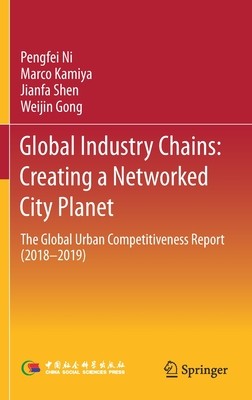
- We will send in 10–14 business days.
- Author: Pengfei Ni
- Publisher: Springer
- ISBN-10: 9811620571
- ISBN-13: 9789811620577
- Format: 15.6 x 23.4 x 3.5 cm, kieti viršeliai
- Language: English
- SAVE -10% with code: EXTRA
Global Industry Chains: Creating a Networked City Planet (e-book) (used book) | bookbook.eu
Reviews
Description
This report presents the outcomes of a survey project of the National Academy of Economic Strategy of the Chinese Academy of Social Sciences and the United Nations Human Settlements Programme. The project evaluated and ranked the competitiveness of 1,007 global cities, with a combined population of over 500,000, based on a number of selected indicators. The report provides an overview of the global urbanization pattern and areas of improvements in the selected cities. The outcomes of the project confirm that the formation and changes of global value chains have caused profound changes in economic structures in some countries and affected the development of cities in these countries, thereby reshaping the city planet.
In addition to comparative analysis of competitiveness of cities, this report also sheds light on the global pattern and trends of economic and human development. It reveals four new findings regarding the development of cities around the world: First, over the past four decades, human societies are transitioning quickly from agricultural societies which are characterized by scattered settlements to industrial societies which are characterized by city clusters, interconnectivity, and resource sharing. The planet where we are living has become a city planet. Second, globalization and the advancements of smart and networking technologies have accelerated urbanization across the world in the past four decades. Third, cities are becoming increasingly metropolitan, interconnected, and smart. Fourth, sustainability scores of the selected global cities show olive-shaped distribution on the world map and sustainability performance of Asia cities has improved continuously.
EXTRA 10 % discount with code: EXTRA
The promotion ends in 21d.17:25:36
The discount code is valid when purchasing from 10 €. Discounts do not stack.
- Author: Pengfei Ni
- Publisher: Springer
- ISBN-10: 9811620571
- ISBN-13: 9789811620577
- Format: 15.6 x 23.4 x 3.5 cm, kieti viršeliai
- Language: English English
This report presents the outcomes of a survey project of the National Academy of Economic Strategy of the Chinese Academy of Social Sciences and the United Nations Human Settlements Programme. The project evaluated and ranked the competitiveness of 1,007 global cities, with a combined population of over 500,000, based on a number of selected indicators. The report provides an overview of the global urbanization pattern and areas of improvements in the selected cities. The outcomes of the project confirm that the formation and changes of global value chains have caused profound changes in economic structures in some countries and affected the development of cities in these countries, thereby reshaping the city planet.
In addition to comparative analysis of competitiveness of cities, this report also sheds light on the global pattern and trends of economic and human development. It reveals four new findings regarding the development of cities around the world: First, over the past four decades, human societies are transitioning quickly from agricultural societies which are characterized by scattered settlements to industrial societies which are characterized by city clusters, interconnectivity, and resource sharing. The planet where we are living has become a city planet. Second, globalization and the advancements of smart and networking technologies have accelerated urbanization across the world in the past four decades. Third, cities are becoming increasingly metropolitan, interconnected, and smart. Fourth, sustainability scores of the selected global cities show olive-shaped distribution on the world map and sustainability performance of Asia cities has improved continuously.


Reviews